Over the past 12 years at Backlinkers, we’ve encountered numerous cases where our clients’ previous link building strategies failed to deliver the expected results or, in some cases, even caused significant harm. What are the underlying reasons for these outcomes? Let us delve into a detailed analysis.
But before we start, here are some real cases of our link building efforts that prove that high-quality links work:
- Despite an increasing number of referring domains, the traffic began to decrease. We stepped in to manage the link building process and successfully turned the situation around for our client in the trading niche:
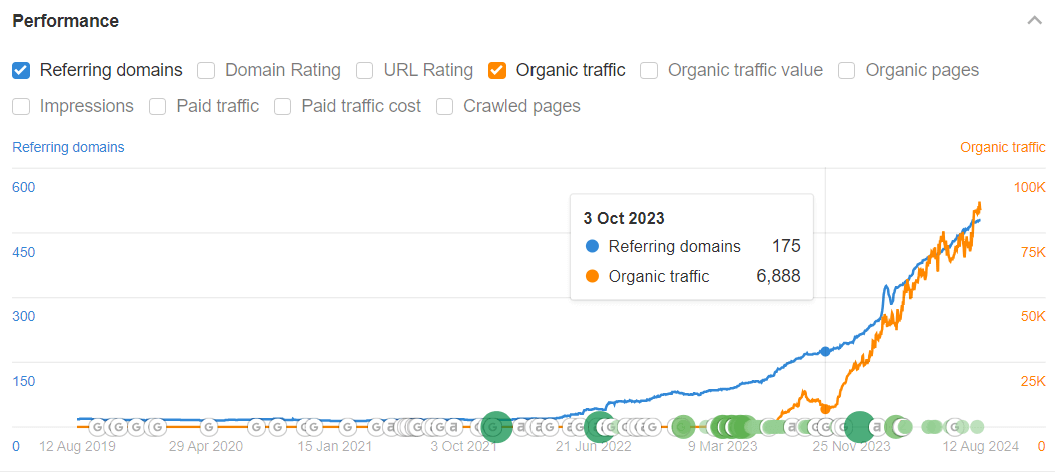
- Before we started our link-building campaigns, some links had already been built for an online weed store. We grew referring domains from 59 to 281, and the website traffic increased from 16К to 25К in 9 months:
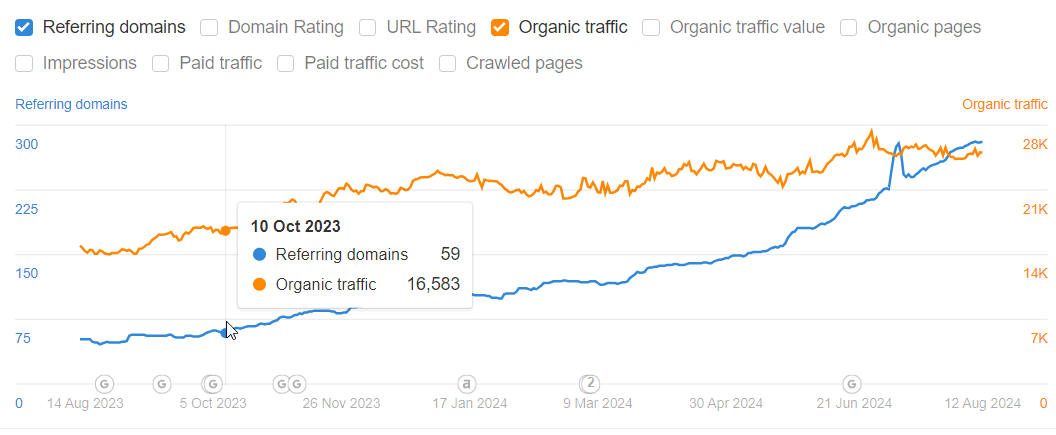
We understand why links fail to deliver the results and know how to fix the issues effectively.
Reasons Why Your Link Building Efforts Don’t Drive Results
There may be different unobvious reasons why your link building strategy doesn’t ensure the desired results. Nonetheless, the most common problems include:
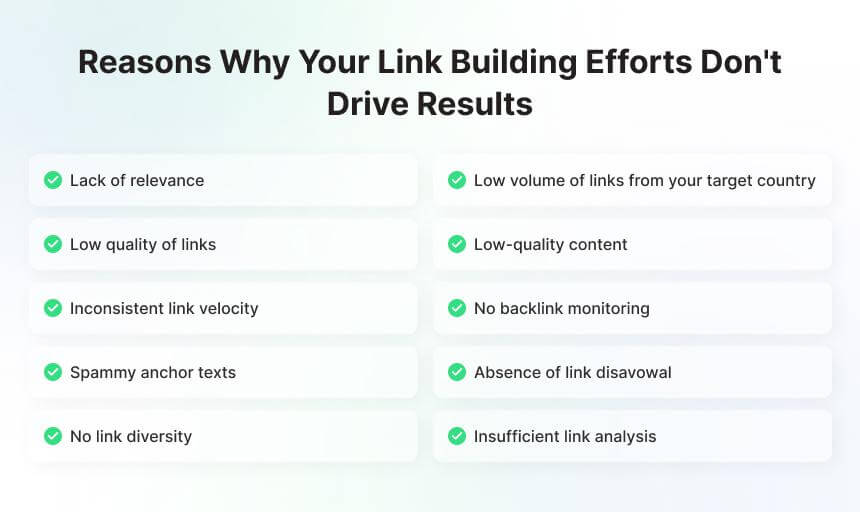
- Lack of relevance
- Low quality of links
- Inconsistent link velocity
- Spammy anchor texts
- No link diversity
- Low volume of links from your target country
- Low-quality content
- No backlink monitoring
- Absence of link disavowal
- Insufficient link analysis
If you want your website to continue growing online, you should ensure none of the mentioned problems slow down its progress. To help you deal with this task, we’ll carefully review each of these issues and offer you efficient tips to overcome them.
Lack of Relevance
Only online sources relevant to your audience and content can provide your website with top-quality backlinks. There is no reason to get references from the site about cooking if you run an automobile business. Moreover, such irrelevant backlinks are likely to affect your rankings.
What Is Link Relevance?
Link relevance means the backlink that directs to your site is closely related to its content and target audience. The references you get from online resources help Google better understand what your website is about. According to the research, link relevance is among the major metrics that identify the backlink’s quality.
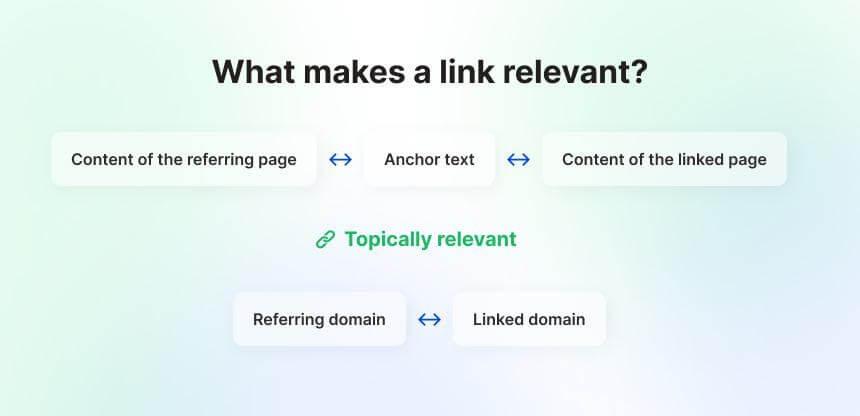
Unfortunately, the anchor text may also be irrelevant to linked and referring pages. For instance, if the anchor says “best grooming services for cats” and leads to the page with dog toys, it will significantly diminish the authority and trustworthiness of the linked website.
Also, if you run an online shop that sells only animal food, getting the backlinks to your pages from the automobile blog is irrelevant. At the same time, if you manufacture pet travel essentials for drivers, these references may stand you in good stead. This is called the niche relevance (or topic relevance).
How Do Irrelevant Links Affect Your SEO Efforts?
First of all, irrelevant links mislead users, offering them to visit a website that doesn’t provide the desired information. Further, there are other serious consequences:
- Low website credibility: If your site regularly gets irrelevant backlinks, search engines will surely reduce its authority, as they consider it less credible and trustworthy.
- Decreased search rankings: Many irrelevant links in your backlink profile will significantly affect your site’s position in search queries. The algorithms will consider that your website doesn’t match important keywords and lower your rankings.
- Higher bounce rate: If a person clicks on irrelevant backlinks to enter your site, they’ll be disappointed to discover there is no desired information. Thus, they’ll immediately leave, increasing your bounce rate.
- Indexing issues: Irrelevant links will confuse crawling bots that analyze your website. It’ll be more difficult for them to understand your site’s content and topic, potentially leading to possible indexing issues.
- Damaged reputation: Both users and search algorithms will consider your site less reliable if they notice it has links from irrelevant online sources.
Key Solutions
If you’ve noticed irrelevant links in your backlink profile, don’t panic! Simply follow these tips to restore your website’s trust:

It’s better to check an online source twice to ensure its backlink won’t harm your site’s reputation and rankings. In addition, it’ll be a good idea to audit your backlink profile occasionally to notice spammy backlinks and remove them.
Low Quality of Links
Low-quality backlinks are references from irrelevant and untrustworthy online sources. Although creating these links is as easy as ABC, in a long-term perspective, they can ruin your website’s ranks and authority.
To avoid such an unpleasant situation and build a high-quality backlink profile, you should always consider metrics such as domain strength, organic traffic, traffic value, etc. They’ll become your orienteers in choosing reputable websites to get references.
How Links with Low Metrics Affect Your Website
The common Ahrefs or Majestic metrics define the quality of the websites that link to your site. If an online source performs poorly, getting links from it will significantly affect the authority of your own website.
Moreover, there is even a chance it’ll be penalized and become invisible to online users. Thus, it’s important to pay attention to the set of metrics while choosing the sites to grow your backlink profile.
What Metrics to Follow?
You should choose the best domains to implement a successful link building strategy. Pay attention to the following metrics while reviewing the websites:
- Domain Strength (DA or DR): This metric refers to the general website’s authority and credibility. Many factors impact DR, including the quality of its backlink profile, content, and overall user experience. We recommend choosing websites with a DR 30+.
- Page Strength (PA): The pages that refer to your website should also include a couple of high-quality backlinks, relevant content, and plausible keyword density. They should also ensure a beneficial user experience. Considering PA is especially important when you build link insertions (niche edits).
- Organic Traffic: The domains with many daily visitors can increase your website’s credibility and generate extra traffic.
- Traffic Value: There is no ideal ratio between traffic and traffic value. However, we recommend selecting sites with a traffic value of at least $1,000, and without a significant gap between the traffic and traffic value.
- Number and quality of referring domains: A reputable website should include many backlinks from authoritative online sources. It’s also great if a site has more referring domains than the linked ones.
- Spam Score (SS): This metric includes 27 features usual for penalized domains. Getting links from websites with SS between 61% and 100% will negatively impact your own Spam Score.
You may use different tools to check link prospects in bulk. For example, a good option is batch analysis in LinkChecker.pro:
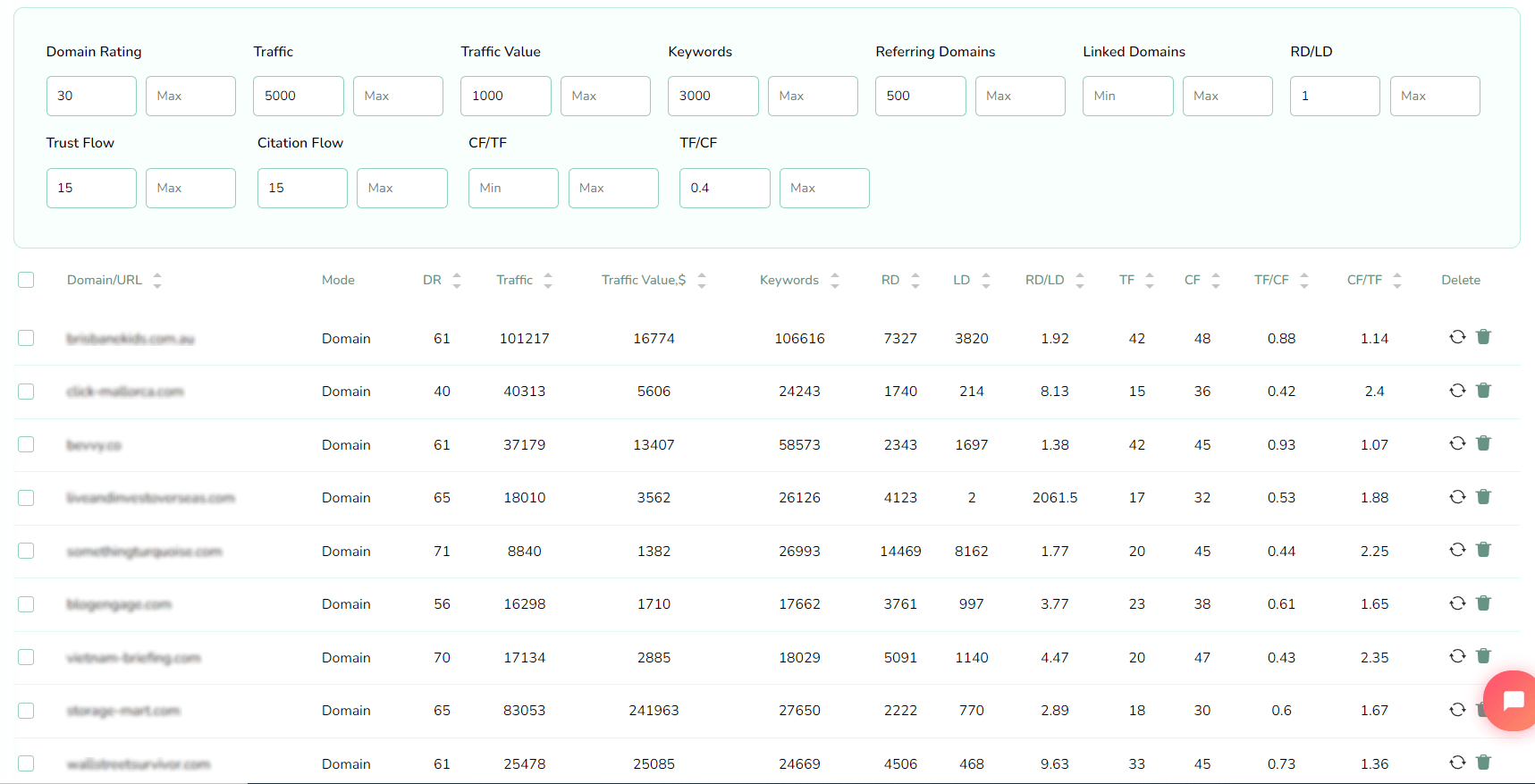
Also, consider the age of the websites. If a site has been actively growing for only 4 months, avoid using it for link building. It’s better to review it again once it has been running for at least one year.
For example, this website had a relatively high DR, 13.8K in organic traffic in August 2024, and showed a positive traffic trend. See what happened next:
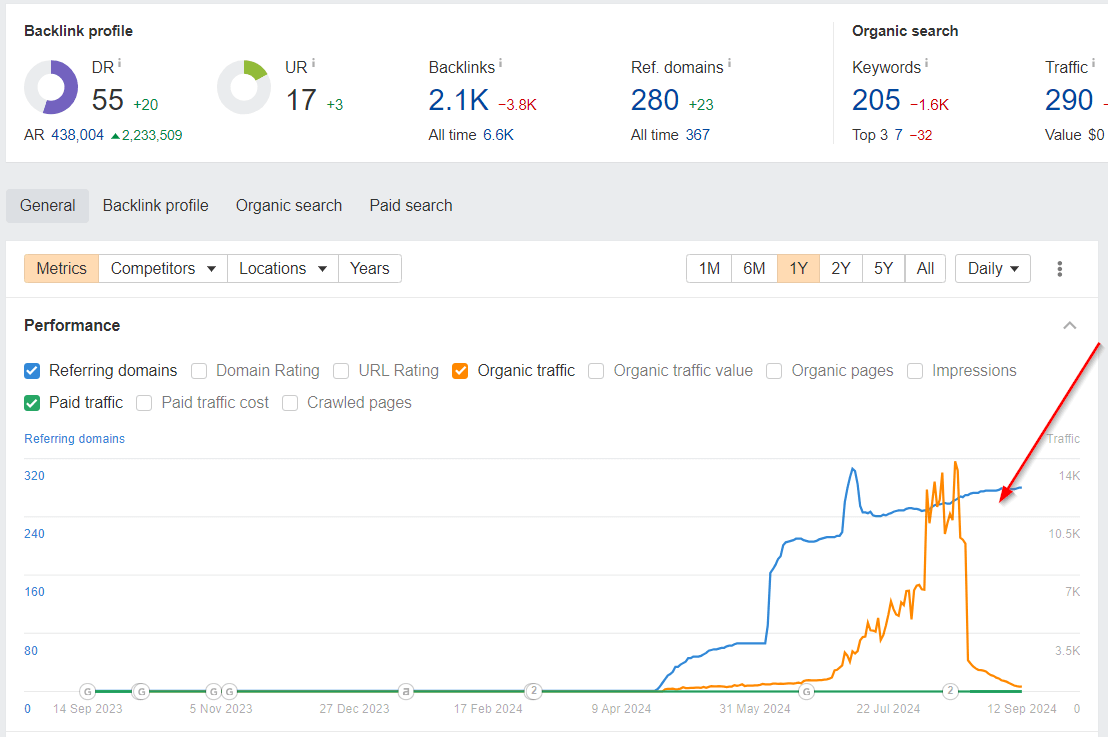
Key Solutions
Low-quality links are among the main barriers between your website and high organic traffic. Don’t let unreliable domains prevent your business from success. Stick to these simple principles:
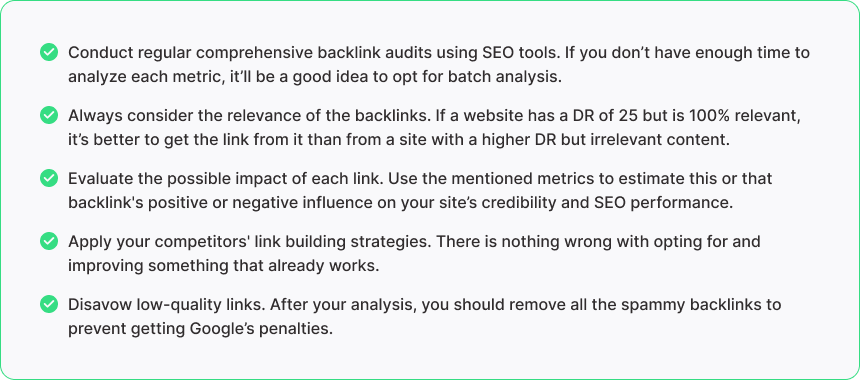
A comprehensive and efficient link audit requires knowledge, special software, and experience. If you aren’t a professional link builder, this task will turn out to be a challenge. Luckily, you can always rely on Backlinkers! Our experts will conduct a detailed link audit and come up with valuable tips to improve your backlink profile.
Inconsistent Link Velocity
Stable link velocity signals that your website organically earns backlinks. On the other hand, search engines may suspect you use black hat link building techniques due to sudden spikes or drops in this activity.
What is Inconsistent Link Velocity?
The inconsistent link velocity may occur when there is no consistency in the rate at which your website acquires backlinks. For example:
- Rapid spikes: The sudden increase in backlinks over a very short period may be considered a manipulative activity.
- Extended gaps: If the mentioned spikes alternate with months of no activity in your backlink profile, it’ll also be highly suspicious.
Why Inconsistent Link Velocity Matters
Search engines consider not only the quality of your backlinks but also the consistency of your backlink profile growth. If their algorithms notice inconsistent link velocity, it may lead to negative results:
- Penalties and drop in rankings: Search engines may consider the sudden spike in your link velocity as a sign of the implementation of manipulative link building methods.
- Inefficient data analysis: If you receive too many links simultaneously, you may be unable to define which link building practices are the most effective for your site.
- Decreased popularity: A sudden drop in your link velocity may hint that the content on your pages loses its relevance and popularity. It’ll also lead to lower search engine rankings.
Key Solutions
Focus on the following principles to achieve organic, rapid growth of your backlink profile:

Spammy Anchor Texts
Anchor text hyperlinks internet users to another website or page. Usually, it’s related to the content of the referred place. Unfortunately, some websites get backlinks from different online resources using the same spammy anchor texts.
As a rule, they do it to increase their ranking for a specific keyword phrase. Such anchors look unnatural and are often “overcrowded” with excessive keywords, such as “Do my essay in Canada for cheap.” Nonetheless, such activity directly violates the Spam Policies for Google Web Search, leading to penalties and decreased rankings.
Here is what spammy anchor texts look like:
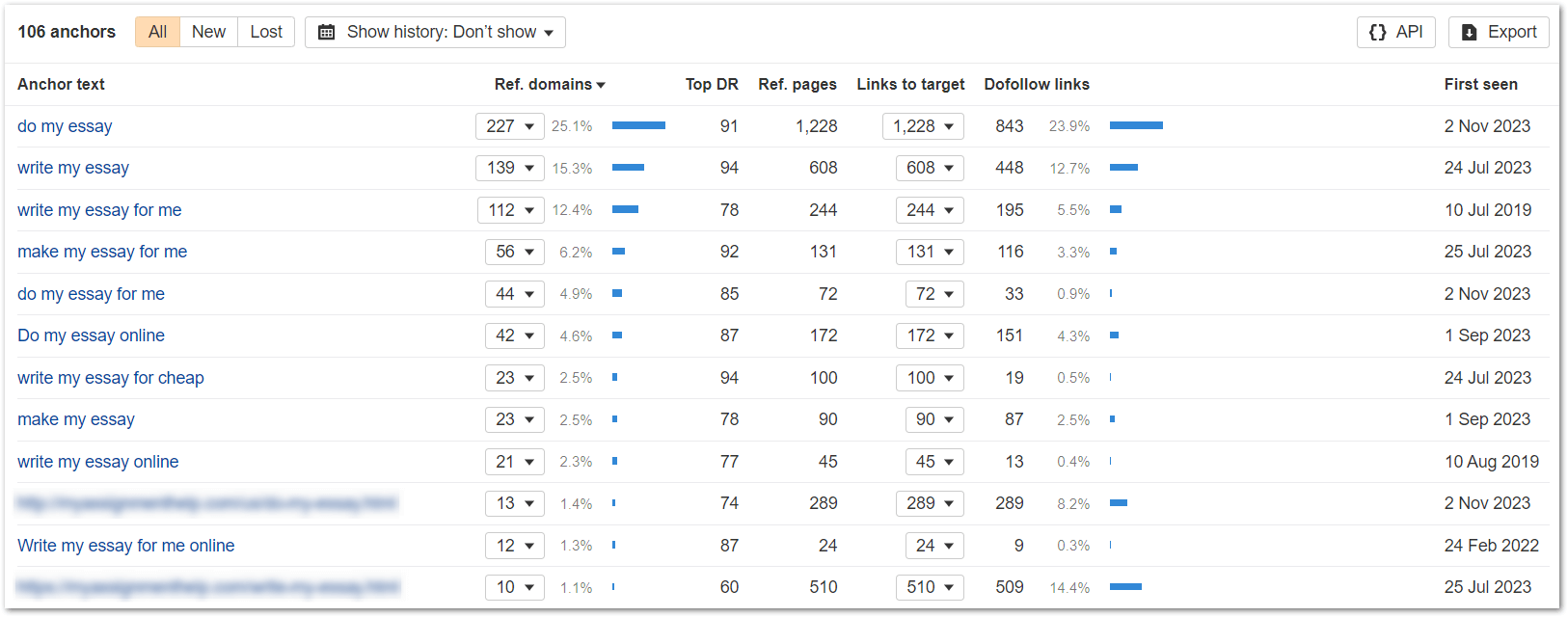
Key Solutions
It’s better to think about the anchors before you start implementing your link building strategy. These tips will help you come up with good ideas:
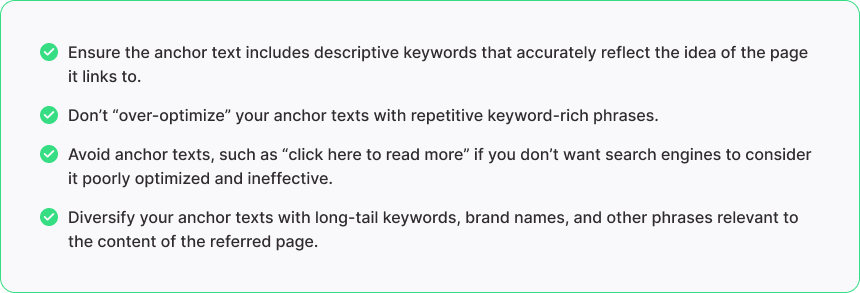
No Link Diversity
Link diversity refers to the variety of backlinks from a wide range of online sources. Ideally, your site should have links from different types of websites, including blogs, directories, social media platforms, online magazines, etc.
The absence of link diversity will make your backlink profile look less natural, decreasing rankings and organic traffic. Also, it’s crucial to have both nofollow and dofollow backlinks.
Dofollow or Nofollow Links?
When it comes to the optimization of your website, understanding the difference between nofollow and dofollow links is essential:
- Dofollow links pass on PageRank. They encourage search engines to crawl and index the links, contributing to the ranking of the referred page.
- Nofollow links don’t pass on PageRank. They don’t provide indexing or crawling purposes. Nonetheless, these links are essential because users can still use them to enter your site and become loyal customers. Also, they prove you don’t try to manipulate your site’s rankings using sponsored links.
You may discover different opinions regarding the ideal ratio between these links. Nevertheless, the majority of the SEO community aims to create a backlink profile that consists of 30-40% nofollow and 60-70% dofollow links.
You may use Site Explorer in Ahrefs to check the link diversity:
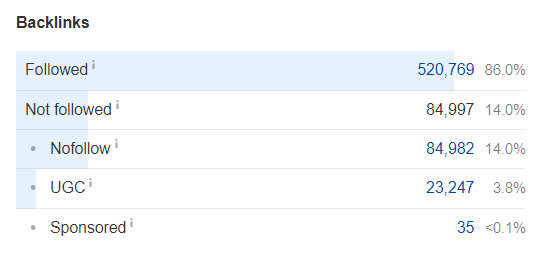
What Happens When a Link Profile Consists of a Few Types of Links?
No link diversity may lead to a variety of serious problems. Search engines will decrease your rankings due to an unnatural backlink profile. It’ll undoubtedly affect your online authority and organic traffic in general.
Key Solutions
Don’t worry if you’ve just checked your backlink profile and noticed it lacks link diversity. Here is what you should do:

Low Volume of Links from Your Target Country
Low link volume from a certain region or country may significantly affect your SEO efforts if your business is focused on providing services there. For example, if you offer plumbing services in NY, you’ll want to get backlinks from relevant online sources popular in the state of New York or the whole US:
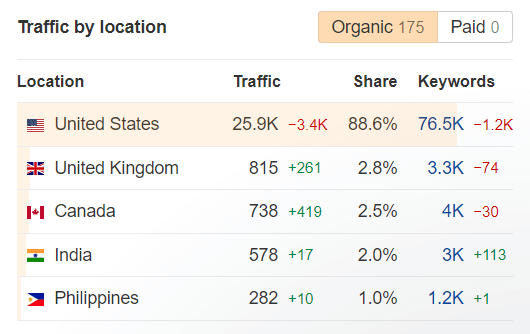
Otherwise, search engines may doubt that your site is interesting to the local community. In this case, they’ll lower its rankings, decreasing your chances of appearing in local search queries.
Key Solutions
Getting links from local and national online sources may be challenging. Luckily, these tips will stand you in good stead:

Low-Quality Content
The hard truth is that your website’s performance doesn’t solely depend on its backlink profile. Sometimes, you may have perfect backlinks but still be unable to reach your SEO goals. In this case, it’ll be wise to audit your content to ensure it includes relevant keywords and provides valuable information for users.
Best Practices for Creating High-Quality Content
According to Google Webmaster Guidelines, valuable and unique content is among the main factors that help your site rank higher. If you want to create engaging, informative, and valuable texts, follow these simple tips:
- Research your audience to create content that resonates with their needs, interests, and pain points.
- Always check the information you use to ensure your texts’ accuracy, relevance, and authority.
- Ensure the presentation of a topic is clear and engaging.
- Improve your content with top-quality visuals like images, infographics, and videos.
- Optimize your content for search engines by implementing proper keywords and headings.
- Always proofread your content before publishing.
Key Solutions
High-quality content creation will help you increase customer engagement and improve your SEO. It’ll be a good idea to start with these pieces of advice:

No Backlink Monitoring
You can’t estimate your website’s progress without monitoring your built and earned backlinks. They are among the main factors that promote your rankings and online authority.
Built links
Imagine you’ve just finished the implementation of a link building campaign. It doesn’t mean that now, you should simply sit waiting to get millions of visitors. It’s important to monitor all the built links if you don’t want to miss one of the following problems:
- The owner of a website that refers to your site may delete the backlinks without informing you about it.
- Links can be changed to nofollow with the help of the rel=”nofollow” tag, meta nofollow tag, and X-robots nofollow or none tags:
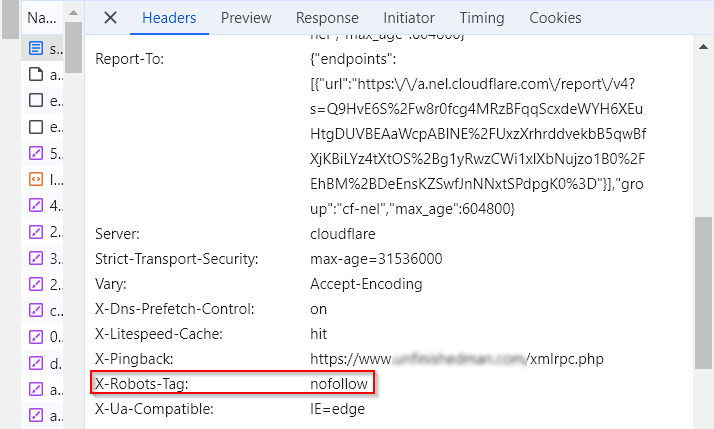
At the same time, you should be aware that when it comes to X-Robots tags, it may be rather complicated to check every link manually. It’s better to use monitoring tools to audit all of them in bulk: 
- The built links can be deindexed both intentionally (by adding a meta noindex tag, an X-Robots noindex tag, or none tag) and unintentionally.
- The built links may become non-canonical.
- The website owner can change robots.txt, disallowing an article with the link to your site (or even the whole category, which includes the reference). It will affect the backlink indexing as search engines get a signal they shouldn’t crawl this link.
- You don’t have control over your anchor text list because the website owner may change the anchor text without warning you.
- Competitors may share the link juice by adding their links to the page with the links leading to your website.
- The website may suddenly change the content with your backlinks by adding links to gray niches.
Without monitoring your backlinks, you simply won’t know how many of them continue driving traffic to your website. Also, you won’t be aware of any possible changes.
Earned Links
If you create top-quality content, it’ll surely get organic backlinks, which you should also monitor regularly. These links may affect your site’s SEO performance due to the following issues:
- Low quality and irrelevancy to your niche;
- Not relevant anchor texts;
- The absence of control over these links.
Moreover, your competitors may use black hat link building tactics to affect your website’s rankings. Thus, you should always know who refers to your content and estimate the quality of these backlinks.
Key Solutions
The good news is that you can handle all your backlinks by following these useful tips:

We at Backlinkers know how to treat our clients’ backlink profiles. If you are also dreaming of the results demonstrated below, our link-building specialists are at your service!

Absence of Link Disavowal
Although any website owner adores getting backlinks, now you know that not all of them are good for your online authority and rankings. If you notice low-quality links damaging your site’s performance, you should disavow them with no remorse. Otherwise, you risk getting Google’s penalties that will hide your website from prospective clients.
Key Solutions
Of course, you may contact the website owner who provides low-quality backlinks to your site and ask them to remove these links. However, if you don’t get an answer, you should take the following steps:

Insufficient Link Analysis
The regular audit of backlinks is an integral part of a successful link building campaign. It helps you analyze the efficiency of your existing backlinks and identify harmful references. Nonetheless, using link monitoring software requires a lot of relevant experience.
If you don’t plan to create a separate link building team for your business, it’s better to rely on outsourced specialists with extensive expertise in this area. Thus, you will save time and money by avoiding mistakes or performing inaccurate analyses of your links.
Conclusion
Getting top-quality backlinks is one of the toughest challenges you’ll face while optimizing your website. If you don’t want your SEO efforts to be useless, you should always keep an eye on the quality of the references you get from other websites. Constantly monitor the efficiency of the built and earned links to discover the best ways to promote your website and attract the target audience.






